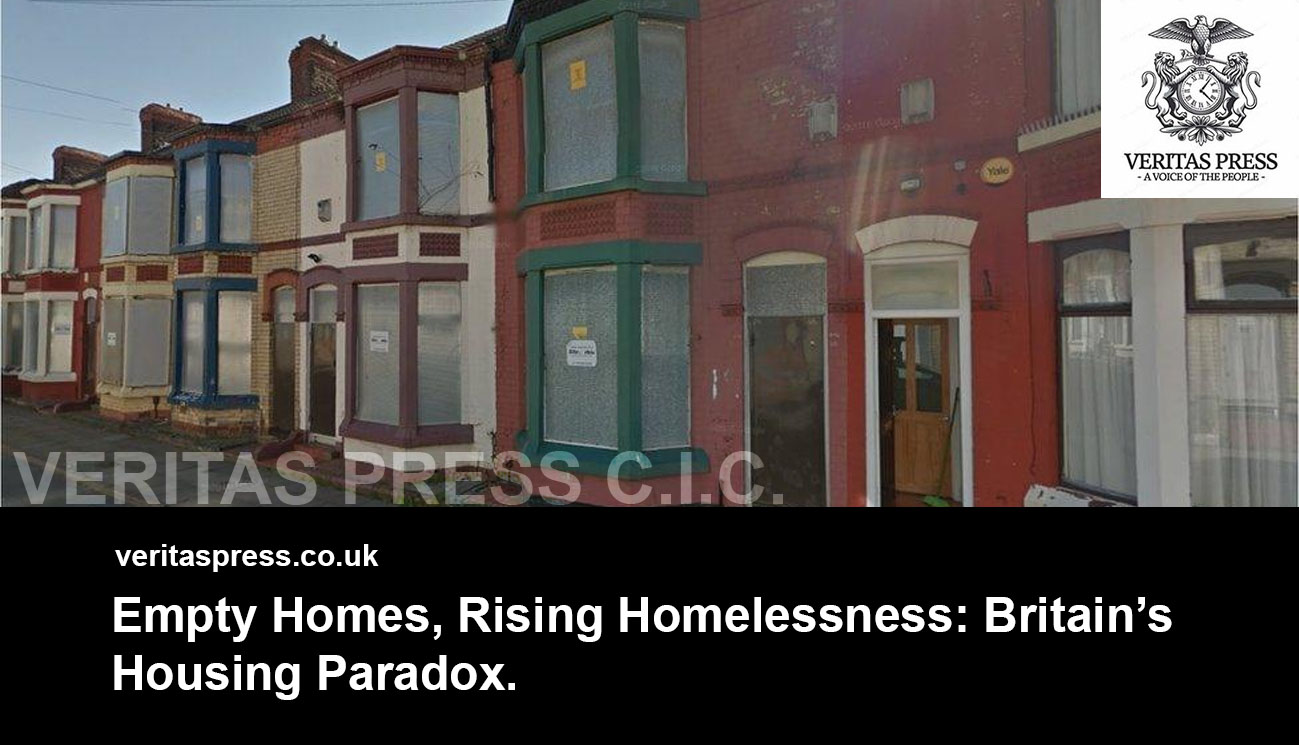Press Release: Veritas Press C.I.C. Author: Kamran Faqir Article Date Published: 22 Aug 2025 at 17:24 GMT Category: UK | Politics | Housing Crisis Source(s): Veritas Press C.I.C. | Multi News Agencies
In 1980, when expectant mother Corina Poore stepped inside a derelict Victorian house in New Cross Gate, south-east London, the estate agent refused to follow her.
“There were dead cats, dog excrement, and filthy mattresses. Pigeons flew through holes in the roof, and there was no indoor toilet,” she recalls.
Yet the property cost just £24,000, and with a council grant of £3,500, Corina transformed the wreck into a home. Today, it’s worth £1 million.
Forty-five years on, the same borough has more than 2,200 empty homes, yet it has issued only 22 renovation grants in the past five years. Across England, 720,000 homes sit empty, with 265,000 vacant long-term, all while 354,000 people are homeless and 1.3 million households wait for social housing.
The paradox is glaring: Britain is gripped by a housing emergency, but hundreds of thousands of properties lie boarded up.
A National Failure:
Campaigners say this is not just an oversight but a policy failure. Action on Empty Homes, a charity that tracks the issue, argues that scrapping the national Empty Homes Programme in 2015 was “a grave mistake.”
“The numbers tell their own story,” says director Will McMahon. “When there was a dedicated strategy, long-term empties fell by a third. Since its abolition, they’ve risen 32%. This is a failure of political will.”
Journalist Peter Apps, who has reported on housing policy for Inside Housing, calls the neglect “symptomatic of Britain’s broken housing system, a state that rewards speculation while punishing need.”
Communities Living With Decay:
For residents, the impact is immediate. In Bristol, Ann Devereaux lives beside a house left empty for years.
“It makes me feel scared when I leave my house or come in at night,” she told local reporters. “It’s become a magnet for crime.”
Stories like Ann’s are common. The Guardian has documented derelict homes linked to squatting, drug use, and arson.
Local authorities are left firefighting. A Lewisham councillor, speaking anonymously, admitted: “We know empty homes damage communities. But without national funding and statutory duties, councils are limited to punitive council tax premiums, and even those can backfire.”
A Market Skewed Toward Speculation:
Economists argue that Britain’s empty homes crisis is a symptom of a deeper market distortion.
Anna Minton, author of Big Capital, describes London’s “buy-to-leave” phenomenon as “housing treated as an investment vehicle rather than a social good.”
She notes that luxury apartments in the capital are sometimes left empty deliberately, “their value preserved as commodities, not homes.”
Labour MP Clive Betts, chair of the Housing Select Committee, has repeatedly warned Parliament that the absence of a national strategy is “fuelling a dual crisis, empty properties in the North, unaffordable rents in the South.”
What Works And What Doesn’t:
There are proven solutions. Kent’s No Use Empty scheme, which offers interest-free loans to owners, has been running for two decades. Nearly 200 homes have been restored in the last five years alone.
Campaigners want it scaled nationally. “It works because it recognises the barriers owners face and provides practical incentives,” says Adam Cliff of the Empty Homes Network.
But such examples are rare. Only 77 of 245 councils in England still provide financial support for bringing empties back into use. Most rely instead on council tax penalties, which sometimes encourage owners to hold properties longer, waiting for a profitable sale.
The Politics Of Housing:
The Labour government has promised 1.5 million new homes this parliament. Housing Secretary Angela Rayner insists that bringing empties back into use will be part of the mix, but campaigners remain sceptical.
“This is not just about numbers,” says Jasmine Basran of Crisis. “We need affordable homes, not just homes. And unless the government imposes a duty on councils to act on empty homes, it will remain a postcode lottery.”
London Mayor Sadiq Khan has pushed the debate further, calling for development on parts of the green belt. He argues that empty homes are “a useful tool, but not a panacea.” His bluntness has sparked political backlash, yet analysts agree with him.
Housing writer John Grimshaw put it starkly:
“Even if every long-term empty home were restored tomorrow, it would buy us less than a year of housing demand. That’s how deep this crisis runs.”
Conclusion: A Manufactured Scarcity, A Political Failure.
Britain’s empty homes crisis is not an accident of economics or an unfortunate quirk of local governance. It is the product of decades of deliberate policy choices that have prioritised speculation over shelter, profit over people, and short-term political optics over long-term social need.
The boarded-up terraces of the North and the hollow luxury towers of London are two sides of the same coin: a housing market that has been financialised beyond recognition. Homes are not treated as the foundation of family and community life, but as commodities, tax shelters, and investment portfolios for the few. Meanwhile, many are left to navigate a system that forces families into temporary accommodation, young adults into permanent precarity, and entire communities into decline.
The numbers expose the scale of this moral contradiction. At least 265,000 long-term empty homes exist in England, many decaying, many hoarded, while 354,000 people are homeless and 1.3 million families languish on waiting lists for social housing. This is not a shortage of physical space; it is a shortage of political courage.
Worse still, inflation continues to drive rents and food prices to historic highs, while social security is systematically hollowed out. Housing benefits have been frozen, universal credit cut, and support stripped back, leaving families with even less ability to compete in a market rigged against them. Employment may technically be on the rise, but stagnant wages, insecure contracts, and zero-hour jobs mean that “work” no longer guarantees stability. Instead, Britain is witnessing the growth of the working homeless, families holding jobs by day yet sleeping in cars, hostels, and shelters by night. Rising employment has not alleviated poverty; perversely, it has widened it.
The result is visible on Britain’s streets: entire families forced to live in hostels, cars, and doorways, while across town perfectly habitable homes are kept locked and empty.
Campaigners and analysts have been clear: where councils are given tools and funding, as with Kent’s No Use Empty scheme, empties can be transformed into lived-in homes. But Westminster abandoned a national strategy nearly a decade ago, leaving councils to improvise with weak enforcement and regressive tax penalties. As Will McMahon of Action on Empty Homes put it: “The state knows what works, it simply refuses to do it.”
Politicians cannot plead ignorance. Parliamentary select committees, housing charities, and even think tanks across the political spectrum have sounded the alarm. Yet governments, Labour and Conservative alike, have chosen to maintain a housing system designed to inflate property values rather than guarantee shelter as a right.
This is why activists such as Jasmine Basran of Crisis argue that empty homes are not just a housing problem but a social justice issue, a visible indictment of a nation that criminalises squatting but tolerates land banking; that evicts families from hostels while allowing speculators to keep buildings idle; that frames homelessness as a personal failing rather than the inevitable outcome of deliberate policy.
The real scandal is not that Britain has empty homes, but that it refuses to use them. This refusal, propped up by a political culture that conflates housing policy with wealth protection, reveals the deeper truth: homelessness and housing precarity in Britain are not the result of scarcity, but of sabotage.
Until housing is treated as a human right rather than an asset class, Britain will continue to live with this grotesque paradox, families without homes, and homes without families, while inflation rises, benefits are cut, insecure employment expands, and the working poor are driven into poverty and homelessness in one of the richest nations on earth.
Tags:
































Leave a Reply